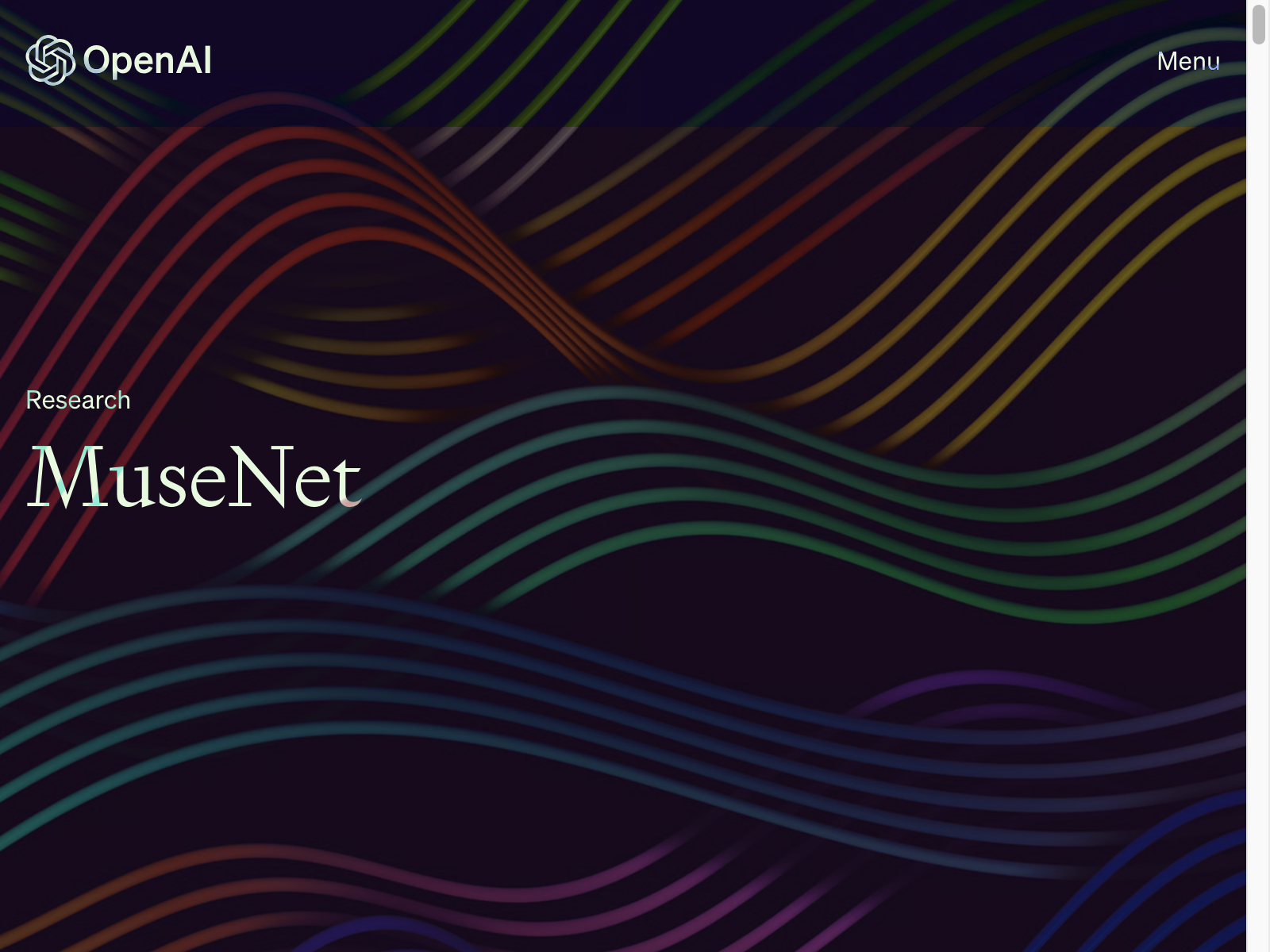Musenet, developed by OpenAI, is an innovative AI tool that enables users to create unique musical compositions. With its ability to generate four-minute compositions using 10 different instruments, Musenet pushes the boundaries of musical creativity. In this review, we will explore Musenet's features, use cases, pros and cons, pricing options, and address some frequently asked questions.
Published on
MuseNet is a deep neural network designed to generate remarkable musical compositions. It utilizes state-of-the-art AI algorithms to combine multiple instruments seamlessly, resulting in harmonious and diverse musical pieces. The neural network has been trained extensively on a vast database of musical scores, allowing it to create original compositions that mimic various genres and styles.
In a world where AI is making strides in various fields, Musenet stands out as a remarkable tool for musicians, composers, and music enthusiasts. With minimal input, this AI-generated musical composition tool can produce awe-inspiring melodies and harmonies that captivate listeners. Musenet's ability to combine various instruments and transition between them effortlessly showcases its versatility. While it may not replace human creativity, it is undoubtedly a valuable source of inspiration for musicians seeking fresh ideas.
Musenet Use Cases
- Music Composition: Musenet serves as an excellent companion for composers looking for new ideas or experimenting with different sounds and genres.
- Soundtrack Creation: Film, television, and game composers can leverage Musenet to develop engaging and evocative soundtracks.
- Education and Training: Musenet can be used as a teaching aid in music schools and institutions, inspiring students to explore new musical horizons and push the boundaries of traditional composition.
- Background Music for Videos: Content creators can incorporate Musenet's compositions as background music in their videos, adding a unique touch and enhancing the overall audiovisual experience.
Musenet Key Features
-
Dynamic Instrument Combinations: Musenet allows users to combine up to 10 different instruments, ranging from piano and violin to drums and trumpets. This flexibility enables composers to create rich and multidimensional compositions.
-
Genre Exploration: With its extensive training dataset, Musenet can mimic various genres, allowing users to experiment with classical, jazz, pop, or niche music styles. This versatility enables musicians to explore uncharted territory and invent new musical genres.
-
Seamless Transitions: Smooth transitions are essential in maintaining the flow and coherence of a musical piece. Musenet excels at transitioning between instruments and musical elements seamlessly, ensuring a fluid and engaging listening experience.
-
Harmonic Sophistication: The neural network underlying Musenet incorporates complex algorithms to generate harmonically sophisticated compositions. Users can expect rich harmonies, satisfying progressions, and melodic layering within their musical creations.
Pros and Cons
Pros:
- Musenet offers a vast range of instrumental combinations and genres for exploration.
- The AI-generated compositions can serve as a valuable source of inspiration for composers and musicians.
- Seamless transitions and harmonic sophistication enhance the overall quality of the generated music.
- Regular updates and improvements from OpenAI ensure a continuously evolving AI tool.
Cons:
- While Musenet provides a remarkable AI-generated musical experience, it may lack the depth and nuance of compositions crafted by human musicians.
- The learning curve for effectively utilizing Musenet's capabilities might be steep for beginners or those unfamiliar with AI-generated music.
Pricing
To get detailed information about Musenet's pricing plans, please visit the official Musenet webpage (opens in a new tab). OpenAI offers different pricing options suitable for both individual musicians and larger institutions, making Musenet accessible to a wide range of users.
Frequently Asked Questions (FAQs)
-
Can Musenet generate sheet music? Musenet primarily focuses on generating the musical audio and does not provide sheet music creation functionality. However, users can transcribe the AI-generated music into sheet music using external software or services.
-
Can Musenet compose unique melodies? Yes, Musenet has the capability to compose unique melodies using its deep neural network. By training on a diverse range of musical scores, it can generate original and captivating melodies.
-
What file formats does Musenet support for exporting compositions? Musenet supports exporting compositions in standard audio formats such as MP3, WAV, and MIDI. Users can select the format that best suits their requirements.
-
Are there any copyright issues when using Musenet-generated compositions? OpenAI offers guidance on usage rights and encourages proper attribution when using Musenet-generated compositions. Users should familiarize themselves with OpenAI's guidelines to ensure compliance with copyright and licensing regulations.
With Musenet, OpenAI has opened the doors to new and exciting possibilities in the realm of AI-generated music. Musicians and composers can now explore uncharted musical territory, find inspiration, and create incredible compositions. Whether you are a seasoned musician or a budding artist, Musenet promises to be a valuable addition to your creative toolkit.

